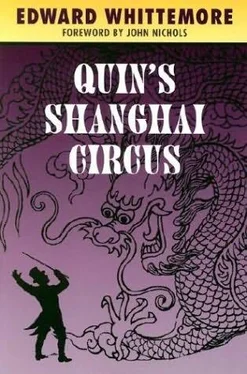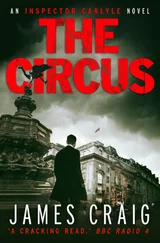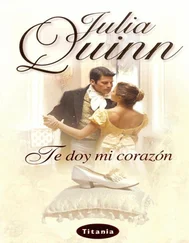Edward Whittemore - Quin’s Shanghai Circus
Здесь есть возможность читать онлайн «Edward Whittemore - Quin’s Shanghai Circus» весь текст электронной книги совершенно бесплатно (целиком полную версию без сокращений). В некоторых случаях можно слушать аудио, скачать через торрент в формате fb2 и присутствует краткое содержание. Жанр: Фэнтези, на английском языке. Описание произведения, (предисловие) а так же отзывы посетителей доступны на портале библиотеки ЛибКат.
- Название:Quin’s Shanghai Circus
- Автор:
- Жанр:
- Год:неизвестен
- ISBN:нет данных
- Рейтинг книги:3 / 5. Голосов: 1
-
Избранное:Добавить в избранное
- Отзывы:
-
Ваша оценка:
- 60
- 1
- 2
- 3
- 4
- 5
Quin’s Shanghai Circus: краткое содержание, описание и аннотация
Предлагаем к чтению аннотацию, описание, краткое содержание или предисловие (зависит от того, что написал сам автор книги «Quin’s Shanghai Circus»). Если вы не нашли необходимую информацию о книге — напишите в комментариях, мы постараемся отыскать её.
Quin’s Shanghai Circus — читать онлайн бесплатно полную книгу (весь текст) целиком
Ниже представлен текст книги, разбитый по страницам. Система сохранения места последней прочитанной страницы, позволяет с удобством читать онлайн бесплатно книгу «Quin’s Shanghai Circus», без необходимости каждый раз заново искать на чём Вы остановились. Поставьте закладку, и сможете в любой момент перейти на страницу, на которой закончили чтение.
Интервал:
Закладка:
I think I might, said Kikuchi-Lotmann. I think it might have to do with No plays. They’re stylizations, aren’t they? The actors wear masks so there can be no doubt of that, then too the number of roles is quite limited no matter what the play. Only a handful really. The witch, the princess, the old man, the brother, and so forth. Now it happens there’s only one thing I know about my parents, and Rabbi Lotmann might have told Father Lamereaux about it just as he told me.
What is it?
Their last circus performance. How they died. Do you know the story of Emperor Taisho opening parliament?
No.
I’ll tell it to you, but just excuse me a minute, please.
The bodyguard with the submachine gun came to order arms, clicked his heels, and handed Kikuchi-Lotmann a second report. He lit a new long cigar and glanced over the single sheet of paper.
Just as I expected, he said. Say no to the automobile franchise in Thailand, offer Icelandic fishing grounds instead. Acquire a controlling interest in Ceylonese tea and let it be known that no ships will be unloaded in Malaysia and no opium allowed out of Turkey unless we get all of Bombay’s male brothels. Send a letter of condolence to the head of the Burundi family. Also agree to finance the airport in the Sulawesi but not the steel mill in Sikkim. Fix the horse races in Buenos Aires and send the proceeds to our London insurance firm. Switch our arms shipments from the sultans in Sabah to the terrorists. In Somalia do the opposite, withdraw support from the terrorists and send tanks to the sheiks. Buy Austrian skiing, sell Libyan electronics. Take control of the trans-Siberian pipeline.
Oil or natural gas? asked the bodyguard.
Natural gas, said Kikuchi-Lotmann. Use our Geneva and Zurich banks. Liquidate our off-shore rights in Africa, take an option on the Brazilian jungle. Levy an eight percent surcharge on all vessels anchored in the Mediterranean. Build a tourist industry on the Caspian in Iran, emphasis on speed boats and snack bars and fast service. Schedule a coal miners’ strike in Finland the day after tomorrow. End the Honduran boycott of Nicaraguan bananas. Put out the order that I want everyone in the organization to get a haircut before the weekend. Don’t bring me any more reports tonight.
The bodyguard backed away. Kikuchi-Lotmann took a new necktie from his pocket.
The Emperor Taisho, he said, was on the throne in the 1920s when Father Lamereaux first came to Japan. There was an event then that made a great sensation although nothing was ever printed about it, naturally. Being god in those days, the Emperor didn’t have much to do. One of his few duties was to open parliament. The chamberlains were always worried how Taisho would handle himself at the opening because he had never been quite right in the head. Well this time he stood at the podium and didn’t seem to be doing anything at all, not even reading his document. He just stood there looking down at the bowed heads, rather a blank expression on his face. After about ten minutes of this had gone by, he smiled suddenly as if an idea had just come to him. All at once he rolled up the document he was supposed to be reading, rolled it up in the shape of a spy glass. He put it to his eye and swept the chamber with it, peeking at one man after another. The chamberlains were rushing to get ahold of him when he yelled out in a high squeaky voice: Hello down there. I am the Emperor. Who are you ?
Kikuchi-Lotmann laughed.
He wouldn’t give up his spy glass, so they had to lead him away and open parliament without the document being read. Well the point is, perhaps that’s what Father Lamereaux is doing. Perhaps he’s saying, I am the Emperor and it’s up to you to answer for yourself. He knew my guardian, he knew your father, he knew the way my parents died. There’s a connection somewhere, and it must have to do with that last circus. With that vast unreal warehouse on the outskirts of Shanghai.
Shanghai?
Of course. Where else in Asia could such a circus have been performed?
After they finished the meal Kikuchi-Lotmann poured brandy. Big Gobi stared at the fire and dozed. A full moon had risen above the canal. It was well after midnight and the city was quiet. Facing the still water from the houseboat, they seemed far from Tokyo.
Kikuchi-Lotmann removed his necktie and tied in its place one of deep crimson.
The circus, he announced, taking off his glasses. His eyes shrank to dots as he recited the poem.
To know its sawdust,
Its smells and rings and highbars,
Is to remember.
A haiku, he said. Not a very good one, but at least of my own making. Now let us recall that other circus, the circus we knew as children. The sweep of the trapeze acts, the grace of the dangerous cats, the ridiculous clowns, the lumbering elephants, the confusing jugglers, the flying bareback riders. A magical show without end because of the magic in a child’s heart.
Yet when we go back years later we see a different performance. The costumes are shoddy, the smells cheap, the clowns not quite so funny, the aerialists not quite so daring. The dream is gone and what we see is crude, even grotesque. Sadness? Yes. Because we know the circus hasn’t changed.
So much for the wonders of childhood. Now for the setting of this particular circus, Shanghai in those last days before the war.
Enormous wealth, enormous poverty. Thousands of entrepreneurs and tens of thousands of slaves. The opium rights to a province lost at a game of cards. Women given fortunes in exchange for an evening of pleasure, or thrown into the baggage train of a warlord as a different kind of payment. Peasant boys reigning as queens one day and tortured to death the next. Hundreds of people slaughtered because a Chinese or Japanese general wakes up in the morning with painful hemorrhoids.
In food the favored delicacy is shrimp fed on human flesh. In alcohol and drugs the preferred mixture is laudanum, which combines the two.
These are the simple facts and figures of Shanghai, a city crowded with White Russians and exiles and adventurers of every kind, the halfway point on the east coast of Asia, a terminal for victims of all breeds and races.
Facts and figures. Are they enough, or is it possible that Shanghai was more than this? Not just a city but a state of mind, or to be more precise, an actual part of the mind? A vision we all carry somewhere within us?
It is here that my father finds himself with his circus one winter late in the 1930s. He is the circus master and my mother, in order to be near him, has taught herself to be an aerialist. A group of wealthy degenerates approaches him for a special performance, a private showing, acts to match the times and mock them. He listens to them and agrees, implying a performance unlike any ever staged. He moves his circus to an abandoned warehouse on the outskirts of the city and goes to work alone rigging the high wires, preparing the props and costumes himself.
The night of the circus comes. It is to begin exactly at midnight. The spectators arrive in evening dress and take their places while the band plays ruffles and flourishes. It is cold in the gloomy warehouse, but the excitement is too great for anyone to bother with that.
Trumpets. A drooping clown holds a sign for silence.
The drum rolls. A juggler spins a shadowy web of balls in the air.
Now we see him stepping into the ring dressed in boots and frock coat, carrying a whip and megaphone, the shaman and arbiter of marvels. He raises the megaphone and we hear the acts he will present.
The one-eyed tomb of Semarang.
The sure-footed vine of Mindanao.
The prancing Brunei horse.
The untamed leopard of Irrawaddy.
Читать дальшеИнтервал:
Закладка:
Похожие книги на «Quin’s Shanghai Circus»
Представляем Вашему вниманию похожие книги на «Quin’s Shanghai Circus» списком для выбора. Мы отобрали схожую по названию и смыслу литературу в надежде предоставить читателям больше вариантов отыскать новые, интересные, ещё непрочитанные произведения.
Обсуждение, отзывы о книге «Quin’s Shanghai Circus» и просто собственные мнения читателей. Оставьте ваши комментарии, напишите, что Вы думаете о произведении, его смысле или главных героях. Укажите что конкретно понравилось, а что нет, и почему Вы так считаете.












